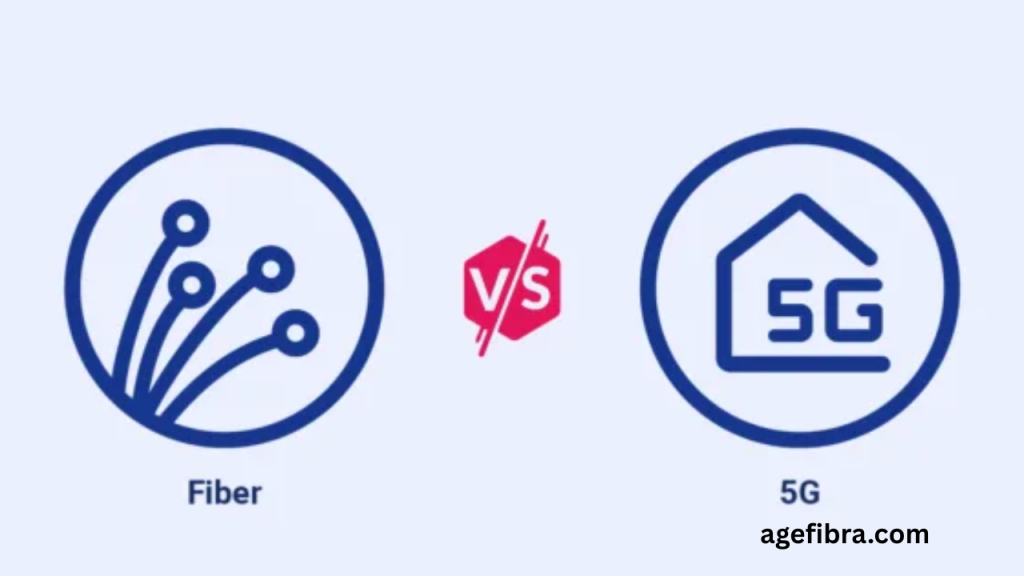As internet demands grow, choosing the right connection becomes more than a technical decision—it shapes your daily digital experience. Whether you’re a remote worker, gamer, streamer, or managing a smart home, understanding the core differences between 5G internet plans vs fiber can help you make an informed choice. These two technologies are dominating the market, each offering high speeds and advanced features, but serving different needs and environments.
In this article, we’ll break down what sets 5G internet and fiber apart, walk you through how to evaluate them based on your usage, cover real-world applications, and help you decide which option is better suited for your lifestyle.
Understanding 5G Internet Plans vs Fiber
What Is 5G Internet?
5G internet is the latest generation of mobile internet technology, providing high-speed wireless connectivity through cellular networks. Unlike previous mobile networks, 5G offers ultra-low latency and can support multiple devices with minimal slowdown, making it ideal for mobile users and home setups without access to wired connections.
Providers typically offer 5G home internet through a router or gateway device that receives signals from nearby cell towers. The setup is relatively simple, and many users experience download speeds ranging from 100 Mbps to over 1 Gbps, depending on location and signal strength.
What Is Fiber Internet?
Fiber internet delivers data through fiber-optic cables that transmit light signals. This physical infrastructure allows fiber to achieve extremely high speeds—often 1 Gbps or more—with ultra-low latency. It is considered the gold standard for stable, high-performance internet in both residential and commercial areas.
Fiber connections require underground cabling, which limits availability in rural or underdeveloped regions but provides unmatched performance wherever it’s installed.
Speed and Performance Comparison
Fiber: Consistent, Lightning-Fast Connectivity
Fiber internet is known for symmetrical speeds, meaning your upload and download speeds are nearly identical. This is particularly important for video conferencing, cloud backups, and uploading large files. Fiber also experiences minimal interruptions during peak hours, ensuring smooth streaming and gaming.
5G: High Speeds, But Variable Conditions
5G internet plans can rival or even exceed fiber speeds in certain areas, especially when millimeter wave (mmWave) technology is available. However, speed consistency can fluctuate due to environmental interference, network congestion, and proximity to the nearest cell tower. Unlike fiber, upload speeds tend to be lower than download speeds on 5G.
Read More: Cheap Internet Plans Under $50 with Reliable Speeds
Installation and Availability
5G Wins in Accessibility
One of 5G’s biggest advantages is its quick deployment. You don’t need technicians or digging; simply plug in a modem and connect. This makes 5G ideal for renters, nomads, or rural users lacking access to fiber.
Fiber Requires Infrastructure
Fiber installation involves laying cables, which can take time and may include installation fees. Although major cities often have robust fiber networks, rural and suburban regions may not yet have access. Where it’s available, though, fiber offers a long-term solution with minimal maintenance.
Use Cases: Real-Life Scenarios
Remote Workers and Professionals
If you rely on video conferencing, cloud tools, and large file transfers, fiber provides consistent performance with minimal disruption. Professionals working from home benefit from fiber’s reliability and speed, especially during critical meetings or uploads.
Students and Light Users
Students or casual internet users living in urban areas with good 5G coverage can benefit from the simplicity of 5G home internet. It handles basic streaming, browsing, and video calls effectively.
Gamers and Streamers
Fiber is the preferred choice for serious gamers and streamers. The low latency ensures smooth gameplay, while the fast upload speeds support high-definition streaming without buffering or lag.
Smart Home Enthusiasts
If your home relies heavily on smart devices, 5G offers a quick setup. However, for homes packed with dozens of connected devices, fiber handles the load more effectively and reliably.
Step-by-Step Guide to Choosing Between 5G Internet Plans vs Fiber
Step 1: Check Availability
Use online coverage maps to determine which services are available at your address. Some areas may only support one option.
Step 2: Evaluate Your Internet Usage
List your typical activities—streaming, gaming, remote work, etc.—and determine how much bandwidth you use. If your household runs multiple devices at once, fiber may be the better fit.
Step 3: Compare Pricing Plans
5G internet plans often offer promotional pricing and no contracts, while fiber might come with installation fees and equipment costs. Balance short-term convenience with long-term value.
Step 4: Consider Future Growth
Think ahead. If you plan on expanding your home network or adding more devices, fiber’s scalability gives you more breathing room.
Step 5: Read Reviews and Speed Tests
Check online forums or social media to find out what others in your area say about speed, reliability, and service support. 5G and fiber performance can vary widely by location.
Common Mistakes to Avoid
Overestimating 5G Coverage
Many assume that if 5G is available, it will offer top-tier speeds. However, not all 5G is the same. Sub-6 GHz 5G has broader coverage but slower speeds compared to mmWave, which is faster but more limited in range.
Ignoring Upload Speeds
Download speed gets the spotlight, but upload speed is just as important, especially for streamers, remote workers, and video calls. Fiber generally outperforms 5G in this area.
Not Factoring in Data Caps
Some 5G internet plans may have soft data caps that throttle your speed after a certain threshold. Fiber plans typically offer unlimited data with no throttling.
Focusing Solely on Price
Cheaper plans may save money short-term, but could result in frustration if they don’t meet your speed or reliability needs.
Expert Insights: Which Is Right for You?
Fiber for Performance-Driven Users
If you’re after the fastest, most stable connection with minimal interruptions, fiber is your go-to. It supports heavy streaming, gaming, and multi-device homes with ease. Ideal for tech-savvy users and professionals.
5G for Flexibility and Portability
If you move often, live in a rural area, or need quick setup without installation, 5G is an excellent alternative. It offers great speeds for light to moderate use and is increasingly improving with expanded infrastructure.
Frequently Asked Questions
Is 5G faster than fiber?
5G can offer fast download speeds, especially with mmWave technology, but fiber generally provides more consistent and symmetrical performance.
Can I game using 5G home internet?
Yes, but you may experience higher latency and occasional lag compared to fiber. It works for casual gaming, but fiber is preferred for competitive play.
Is 5G internet truly wireless?
Yes, 5G internet is wireless and relies on cellular signals. You receive internet through a router that connects to a 5G tower, no cables needed.
Does fiber internet require a phone line?
No, fiber uses fiber-optic cables and does not depend on traditional copper phone lines, unlike DSL or older technologies.
Is fiber internet more expensive than 5G?
It depends on the provider, plan, and location. Fiber may come with upfront installation costs, but it offers better value in the long run.
Can I stream 4K videos on 5G internet?
Yes, most 5G home internet plans support 4K streaming, provided you have strong signal strength and sufficient bandwidth.
Will fiber internet become outdated?
Unlikely. Fiber-optic technology is future-proof and scalable, capable of handling increasing data demands for decades.
Conclusion
Choosing between 5G internet plans vs fiber comes down to your specific needs, location, and long-term internet goals. Fiber stands out for its unbeatable speed, reliability, and upload performance—ideal for high-demand users, families, and professionals. On the other hand, 5G is revolutionizing flexibility, offering fast speeds without the hassle of cables or long installations, especially in places where fiber hasn’t reached. Evaluate your usage patterns, check availability in your area, and consider how each option aligns with your digital lifestyle. Whether you’re upgrading for work, play, or everyday streaming, the right choice ensures a smoother, faster online experience from the start.


